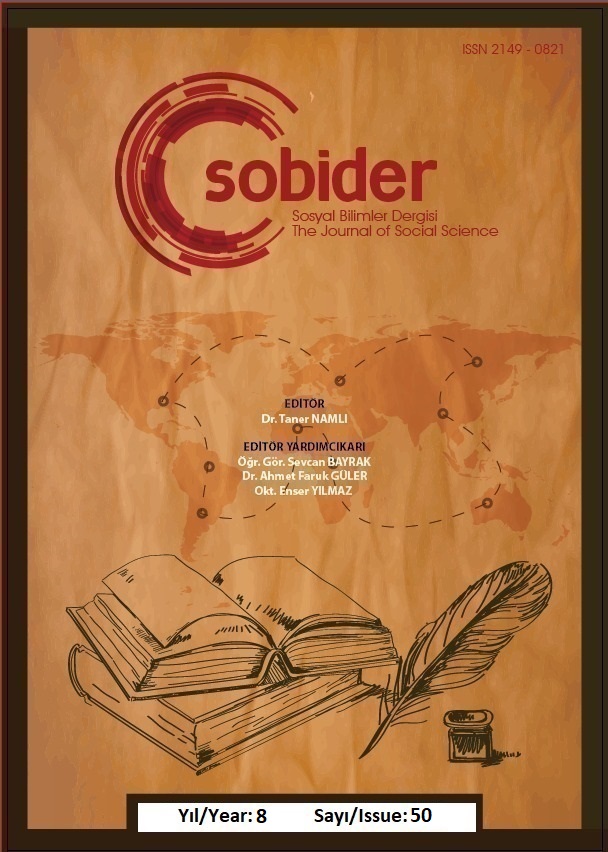Author :
Abstract
Elektronik iş uygulamalarının hizmet sektöründeki işletmelerin uygulamaların başarısı üzerindeki etkilerini araştırmak üzere ERP, SCM, CRM ya da E-Ticaret sistemlerinden en az birini işletmeleri içerisinde uygulamaya almış işletmelerin bu uygulamaları edindikten sonra işletme performanslarındaki olumlu veya olumsuz yönde nasıl bir değişim gerçekleştirdiğini ortaya çıkarmayı hedeflemektedir.
İşletmelerin performans ölçümüne dair literatür taraması ve çalışması sonrası elde edilmiş olan performans kriterleri kullanılmış. Bu çalışmanın varsayımları içerisinde olan elektronik iş sistemlerinin işletmenin performansında ki olumlu olumsuz değişimin istatiksel olarak farkların anlamlı olup olmadığını ölçümlemek adına sunulmuş olan hipotezleri test etmek üzere yapılan çalışma kapsamında, veri ve bilgi toplamak için anket yöntemi uygulanmıştır. Anketler İnternet üzerinden firmalara gönderilmiştir. Anket formu oluşturulurken hem firmanın genel yapısı hakkındaki bilgilere ulaşmak, hem de elektronik iş sistemleri hakkında bilgi edinilebilecek sorular anket formu içerisine eklenmiştir. Anket formu toplamda 15 adet sorudan oluşmaktadır. Oluşturulan 15 ana soru içerisinde ayrıntılı alt sorularda mevcuttur. Anket formu seçmeli ve çoktan seçmeli sorular ile zenginleştirilmiştir. Gelen sonuçlar SPSS analiz programı içerisinde analiz yapılmıştır. Elektronik iş uygulamalarından en az birini bünyesinde barındırdığını söyleyen firmalara yapılan anketler sonucunda iş performanslarında değişimin olup olmadığını gözlemlemek adına testler yapılmıştır. Yapılan çalışma kapsamında ortalamalar alınıp, çaprazlama, ANOVA testleri ve Regresyon analizleri yapılmıştır. Analizler sonucunda elektronik iş uygulamalarının firmaları genel olarak olumlu yönde etkilediği tespit edilmiştir.
Bu çalışma, Tüm dünya üzerinde kullanılıyor olan elektronik iş uygulamalarını ülkemiz içerisinde ne derece başarılı bir şekilde kullanıldığını ölçümlemek hangi elektronik uygulamaların daha verimli kullanıldığını anlamak bu uygulamaları bünyesine katmayı düşünen işletmelerin kendi bünyesine katmaları adına fikir vermesi, elektronik iş uygulamalarını pazarlayan firmalara da sektörün eksikliklerini onların ihtiyaçlarını gidermeleri yeni elektronik iş uygulamaları geliştirebilmesi adına sektörü tanımaları ve uygulamaların eksik yönlerini görmeleri açısından önem taşımaktadır.
Keywords
Abstract
In order to investigate the effects of electronic business applications on the success of applications in the service sector, it aims to reveal how businesses that have implemented at least one of the ERP, SCM, CRM or E-Commerce systems within their businesses have made a positive or negative change in their business performance after acquiring these applications.
Performance criteria obtained after literature review and study on performance measurement of enterprises were used. Within the scope of the study to test the hypotheses presented in order to measure whether the positive and negative changes in the performance of the business of electronic business systems, which are among the assumptions of this study, are statistically significant or not, a questionnaire method was applied to collect data and information. The questionnaires were sent to companies over the Internet. While creating the questionnaire form, questions that can reach information about the general structure of the company and electronic business systems were added to the questionnaire form. The survey has 15 questions in total. There are detailed sub-questions within the created 15 main questions. The questionnaire form is enriched with optional and multiple-choice questions. The results were analyzed in the SPSS analysis program. As a result of the surveys made to companies that stated that they have at least one of the electronic business applications, tests were conducted to observe whether there was any change in their business performance.
Within the scope of the study, averages were taken, cross examine ANOVA tests and Regression analysis were performed. As a result of the analysis, it has been determined that electronic business applications have a positive effect on companies in general.
This study, in order to measure electronic business applications that are used all over the world in a highly successful environment from our country, gives the idea of which electronic applications you think are more efficient to incorporate these applications into their own structure, and electronic business applications to companies to eliminate the shortcomings of the sector from our country in order to develop new electronic business. It is of great importance that they recognize and see the shortcomings of the applications.
Keywords
- Davenport, T.H (1998) Putting the Enterprise into The Enterprise System. Harvard Business Review, 76(4), 121-131.
- Igbaria, M., Zinatelli, N. & Cavaye, A.L.M. (1998). Analysis of Information Technology Success in Small Firms in New Zealand. International Journal of Information Management, 18(2), 103-119.
- Koh, S.C.L; Maguire, S. (2004) Identifying th Adoption of E-Business and Knowledge Management Within SMEs Journal of Small Business and Enterprise Development,10(3),338-348
- Laukkanen, S.; Sarpola, S. & Hallikainen, P. (2007). Enterprise Size Matters: Objectives and Constraints of ERP Adoption. Journal of Enterprise Information Management, 20(3), 319-334
- Mabert, V.A.; Ashok, S. & Venkataramanan, M.A. (2000). Enterprise Resource Planning Survey of US Manufacturing Firms. Production and Inventory Management Journal, 41(2), 52-58.
- Premkumar, G. & Roberts, M. (1999). Adoption of New Information Technologies in Rural Small Businesses. Omega, International Journal of Management Science, 27(1), 467484.
- Olhager, J. & Seldin e (2003) Enterprise Resource Planning Survey of Swedish Manufacturing Firms. European Journal of Operation Research 146(3),365-373.
- Quayle, M. (2002). E-Commerce: The Challenge for UK SMEs in the Twentieth Century. International Journal of Operations and Production Management, 22(10), 1148- 1161
- Thog, J.Y.L (2001). Resource Constraints and Information Systems Implementation in Singaporean Small Business. Omega,29(2), 143-156
- TUBİSAD Bilgi ve İletişim Teknolojileri Sektörü 2017 Pazar verileri – Mayıs 2018
- TUİK, Hanehalkı Bilişim Teknolojileri (BT) Kullanım Araştırması, 2020. (https://tuikweb.tuik.gov.tr/PreHaberBultenleri.do?id=33679) [16.01.2021]
- TUİK, Girişimlerde Bilişim Teknolojilerinin Kullanım Araştırması, 2020 (https://tuikweb.tuik.gov.tr/PreHaberBultenleri.do?id=33677) [16.01.2021]
- Yegül, M.F. & Toklu B. (2004). Türkiye’de ERP Uygulamaları. Endüstri Mühendisliği Dergisi (1). (http://www.mmo.org.tr/endustrimuhendisligi/2004_1/ERP_uygulamasi.htm). [21.11.2020]





